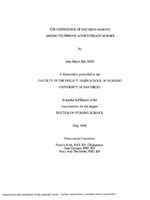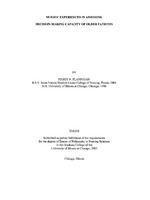The experience of decision-making among telephone advice/triage nurses
View File(s)
- Author(s)
- Details
-
Ann M. Mayo, RN, DNSc
- Sigma Affiliation
- Gamma Gamma
- Zeta Mu at-Large
Visitor Statistics
Visits vs Downloads
Visitors - World Map
Top Visiting Countries
| Country | Visits |
|---|
Top Visiting Cities
| City | Visits |
|---|
Visits (last 6 months)
Downloads (last 6 months)
Popular Works for Mayo, Ann M. by View
| Title | Page Views |
|---|
Popular Works for Mayo, Ann M. by Download
| Title | Downloads |
|---|
View Citations
Citations
The role of the telephone advice/triage nurse is both complex and demanding. All decisions are made while assessing patients without seeing or touching patients. In addition, the role is often developed to decrease health care costs which can be perceived by nurses as being in conflict with their nursing beliefs. The ambiguous nature of the role makes these nurses' daily experiences with decision-making a challenge. Using a phenomenological method, the lived experience of decision-making among telephone advice/triage nurses was explored by conducting multiple interviews with ten nurses. The internal structure of the lived experience was identified through the philosophical perspective of Merleau-Ponty's phenomenology of perception and the process of Van Manen's researching lived experience. Eight essential themes emerged to explain the lived experience. Connecting relationships between nurses and patients were critical to the process of decision-making as well as to what it meant for the nurses to be decision-makers. Nurses involved patients in decision-making, utilized decision-making support protocols, considered deviating from protocols, and sought validation for certain decisions. The nurses' perceptions of what it was like to assume responsibility for decision-making reflected feelings of self-accountability to job responsibility. All nurses realized that they needed to know clinical information about their patients, but some shared that they needed to maintain an awareness of their personal knowing to support their decision-making. Different ways of coming to decisions included making justifiable decisions based upon what was best for the patient, validating the right call based upon nurse comfort, and striking a balance based upon maintaining system equilibrium between patient satisfaction and the health care organization's resources. All nurses spoke of themselves as decision-makers and sensed feelings of confidence, certainty, and uncertainty in being decision-makers. All study themes were conjoined, occurring simultaneously among the descriptions of the decision-making experience. The study's findings support theoretical work in decision-making as well as cognitive development. Focusing upon the experience and meaning of decision-making, bringing to light the everyday experience of nurse decision-making has important implications for the science of nursing and clinical practice.
This dissertation has also been disseminated through the ProQuest Dissertations and Theses database. Dissertation/thesis number: 9830329; ProQuest document ID: 304489891. The author still retains copyright.
This item has not gone through this repository's peer-review process, but has been accepted by the indicated university or college in partial fulfillment of the requirements for the specified degree.
| Type | Dissertation |
| Acquisition | Proxy-submission |
| Review Type | None: Degree-based Submission |
| Format | Text-based Document |
| Evidence Level | Phenomenology |
| Research Approach | Qualitative Research |
| Keywords | Telehealth; Patient Triage; Nursing Roles |
| CINAHL Subject(s) | Decision Making, Clinical; Telenursing |
| Grantor | University of San Diego |
| Advisor | Roth, Patricia |
| Level | Doctoral-Other |
| Year | 1998 |
All rights reserved by the author(s) and/or publisher(s) listed in this item record unless relinquished in whole or part by a rights notation or a Creative Commons License present in this item record.
All permission requests should be directed accordingly and not to the Sigma Repository.
All submitting authors or publishers have affirmed that when using material in their work where they do not own copyright, they have obtained permission of the copyright holder prior to submission and the rights holder has been acknowledged as necessary.
Related items
Showing items related by title, author, creator and subjects.
-
Clinical decision-making among nursing students: An interpretive study
White, Ann HansonClinical decision making has been identified as one of the most important contributions made by the professional nurse in the care of patients. Yet as a discipline, we continue to question what factors influence the ... -
An innovative roadmap to guide nursing across the shared decision-making continuum
Waters, Phyllis Jean; George, Sibil; Liong, Anne; Lundeen, Suzanne; Moore, Lourdes R.; Kirksey, Kenn M.A qualitative, descriptive study was conducted to determine registered nurses' perceptions of using a shared decision model to make practice and professional role decisions. The specific aim was to infer perceptions of ... -
Nurses' experiences in assessing decision-making capacity of older patients
Flannigan, Peggy N.A qualitative study was undertaken to explore and describe nurses' experiences in assessing decision-making capacity of patients over age 65 years. Their experiences with surrogate decision-makers were also described ... -
Nurses' attitudes toward assisting patients/families with end-of-life decision-making
Wise, Susan M.Nurses often feel unable to help with decision-making near the end of life. The purpose of this study was to develop an instrument to measure medical-surgical nurses' attitudes toward assisting patients and families with ... -
Do simulation roles really affect clinical decision-making accuracy in an acute care scenario?
Zulkosky, Kristen D.; White, Krista; Price, Amanda L.; Pretz, Jean (2017-08-17)The purpose of this study was to assess the accuracy of on clinical decision making (CDM) among various roles in an acute-care simulation scenario in pre-licensure nursing students. This study utilized a mixed factorial ...





